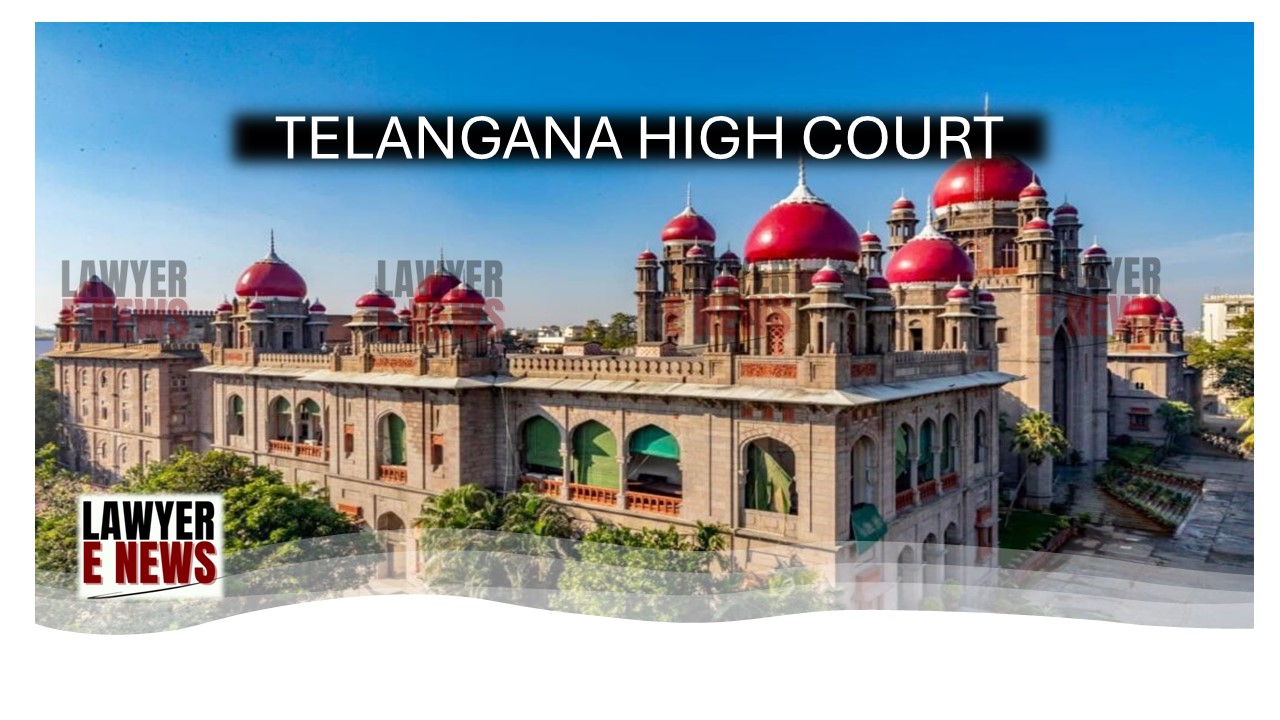-
by Admin
18 February 2026 3:03 AM



Telangana High Court delivered a crucial judgment in Aruna Naiki vs. Laxmi Devi (CRP No. 457 of 2024), clarifying that an Election Petition filed before an incompetent forum cannot benefit from the condonation provisions under Section 14 of the Limitation Act, when the statute itself is a self-contained code with fixed limitation. Justice Laxmi Narayana Alishetty allowed the revision petition and quashed the election challenge against Aruna Naiki, setting aside the proceedings as time-barred.
The High Court ruled: “The time spent in a wrong forum cannot be condoned in election petitions under the Telangana Municipalities Act, 2019. The Act being a special and complete code, the Limitation Act provisions stand excluded.”
“Filing Election Petition in Wrong Court Can’t Be Saved by Equity When the Law Is Clear”
The case arose from Ward No. 29 elections of Gadwal Town Municipality held on 22 January 2020, with results declared on 25 January 2020. The petitioner, Aruna Naiki, emerged successful, while the respondent Laxmi Devi lost and subsequently filed EOP No. 06 of 2020 under Section 233 of the Telangana Municipalities Act, 2019, seeking to declare Aruna’s election void.
However, the petition was initially filed before the III Additional District Judge at Gadwal, which the High Court later held lacked jurisdiction, since Principal District Judge alone is competent to act as Election Tribunal under Rule 4 of the Telangana Municipalities and Municipal Corporations Rules, 2020.
“It is undisputed that at the relevant time, the Principal District Judge, Mahabubnagar, had territorial jurisdiction. The III Additional Judge was not the competent Tribunal to try the EOP,” the Court noted.
After the Election Petition was returned by the III Additional Judge on 30.11.2021, Laxmi Devi refiled it before the correct forum—the Principal District Judge, Jogulamba-Gadwal District—on 10.11.2022, nearly two years and nine months later.
“Election Laws are Special Codes—Limitation Must Be Rigidly Applied”
Aruna Naiki moved for rejection of the re-presented petition, contending: “The petition is hopelessly time-barred. Section 14 of the Limitation Act cannot be invoked in a special statute like the Telangana Municipalities Act, which prescribes a rigid 30-day limitation period.”
It was contended that: “The Election Petition was filed before an incompetent forum, and the law under Section 233 mandates strict compliance. Once limitation is breached, the petition becomes legally non-maintainable.”
In response, Laxmi Devi argued: “The petition was filed in good faith before the III Additional Judge who functioned within the Gadwal jurisdiction. The delay should be condoned as a curable defect. The security deposit was made with the court and no objection was raised during filing.”
“Doctrine of Curable Defect Does Not Apply to Jurisdiction or Limitation”
Justice Laxmi Narayana Alishetty observed that filing before a wrong forum was not a mere procedural irregularity, but a jurisdictional defect.
The Court made a clear distinction: “At the time of filing, the judicial reorganisation was incomplete—Jogulamba-Gadwal District was created on the revenue side but the Principal District Judge of Mahabubnagar retained judicial jurisdiction.”
Hence, the Election Petition should have been filed before the Principal District Judge, Mahabubnagar, not the III Additional Judge at Gadwal, who had no authority under Rule 4 and Section 233 to try election disputes.
“Thus, the Election Petition was obviously filed before a wrong forum. The subsequent representation before the right forum occurred well beyond the statutory time limit.”
Referring to the Supreme Court’s ruling in Suman Devi, the Court stated: “The Municipalities Act, like the Panchayat Raj Act, is a complete code. When the statute prescribes 30 days to file an Election Petition, any filing beyond this without legislative extension becomes void.”
The Court rejected the plea to invoke Section 14 of the Limitation Act: “Section 14 cannot be imported into special statutes unless explicitly permitted. The Municipalities Act contains no such relaxation. The intent is strict compliance to ensure finality in election matters.”
“Deposit of Security Amount Need Not Be Decided When Petition Is Time-Barred”
Since the petition was quashed on the ground of limitation, the Court chose not to adjudicate on the issue of security deposit, stating:
“Once the petition is held to be time-barred, the question of whether the deposit of Rs. 5,000/- was made or not becomes academic.”
The Telangana High Court’s ruling underscores a firm legal principle: election disputes must strictly adhere to the timelines and procedural mandates under special statutes, and filing in a wrong forum cannot be later remedied by equitable doctrines.
Justice Alishetty concluded: “The Principal District Judge erred in refusing to reject the Election Petition despite clear limitation breach. The impugned order dated 29.11.2023 is set aside. The Election Petition stands rejected as time-barred.”
Date of Decision: 4 April 2025
